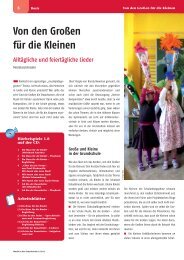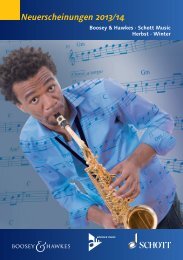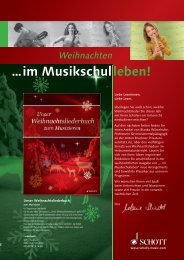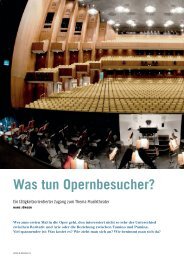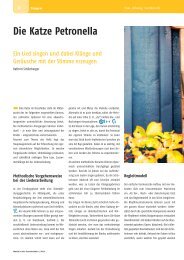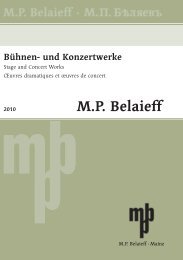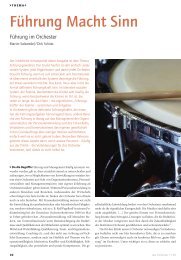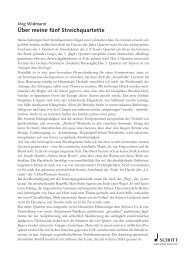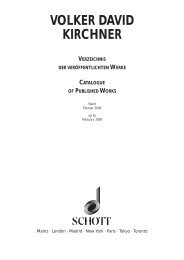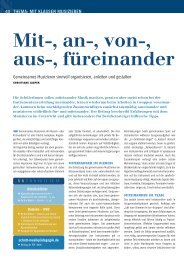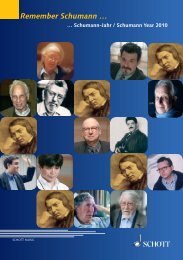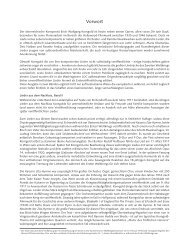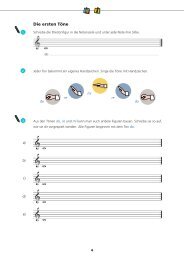HANS WERNER HENZE - Schott Music
HANS WERNER HENZE - Schott Music
HANS WERNER HENZE - Schott Music
Erfolgreiche ePaper selbst erstellen
Machen Sie aus Ihren PDF Publikationen ein blätterbares Flipbook mit unserer einzigartigen Google optimierten e-Paper Software.
T<br />
he setting is near Fehrbellin and Berlin in the<br />
year 1675. The young Prince of Homburg experiences<br />
one of his periodical somnambulistic<br />
states in which he sees himself as the victor of the approaching<br />
battle. Whilst still caught up in his dreams,<br />
he misinterprets a joke made by the Elector and imagines<br />
that the latter has brought him together with the<br />
Elector’s niece Natalie with whom he is passionately<br />
enamoured. In a state of bewilderment following his<br />
rejection by Natalie, he omits to hear the Field Marshall’s<br />
order not to intervene in the battle until the<br />
Elector gives a specific command.<br />
The Prince observes the progress of the battle and issues<br />
an independent order to attack to his regiment.<br />
The battle concludes with a glorious victory; the Elector<br />
is however believed to have been killed in action.<br />
While the Prince is assuring Natalie and the Electress<br />
of his support, the Elector appears unexpectedly; his<br />
horse had been shot under him in battle. He has the<br />
Prince arrested on charges of insubordination.<br />
The court martial sentences the Prince to death. There<br />
are plans for Natalie to be given in marriage to the<br />
King of Sweden as a security for peace. The Prince<br />
pleads for mercy from the Electress and Natalie appeals<br />
to the Elector for clemency. The Elector agrees<br />
on one condition: if the Prince declares the judgement<br />
to be unjust, he will be pardoned.<br />
The Prince rejects this suggestion: he is prepared to<br />
suffer for his error. The Elector asks the officers if they<br />
still retain their respect for the Prince and the officers<br />
give their unconditional affirmation. The Elector tears<br />
up the death sentence document.<br />
Disassociated from reality by his somnambulism, the<br />
Prince awaits his death. He does not notice the Elector<br />
and his court approaching, accompanied by Natalie<br />
who crowns the Prince with a laurel wreath: his<br />
dream has become reality.<br />
Henze was inspired to compose the opera Der Prinz<br />
von Homburg by Luchino Visconti with whom he had<br />
collaborated on the ballet Maratona di Danza in 1957.<br />
Particularly in the dream sequences, he is ingenious in<br />
his utilisation of shimmering complex tonal textures<br />
to create a highly impressive musical illustration of the<br />
somnambulistic character of the Prince.<br />
“<br />
The Prince of Homburg, our cousin, the<br />
Hamlet of the Mark Brandenburg, is the hero<br />
of my new opera. […] It is quite plausible to abstract<br />
the world which Kleist has created in his work beyond<br />
the confines of its Prussian background. […]<br />
The “Prince of Homburg” focuses on the glorification<br />
of a dreamer, the destruction of the traditional<br />
concept of a classical hero: the essence is the blind<br />
and unimaginative application of laws and the glorification<br />
of human benevolence whose comprehension<br />
also strays into more profound and complex<br />
areas than would be “normal” and permits a man to<br />
find his place in the world despite being a dreamer<br />
and sentimentalist, or maybe precisely because of<br />
this. The concluding rallying cry “In Staub mit allen<br />
Feinden Brandenburgs!” [Down with the foes of<br />
Brandenburg!] in favour of this ideal nation in which<br />
(according to Kleist) love, understanding, forgiveness<br />
and mercy play such a substantial role, is also<br />
a tilt at the rigidity and indolence of the “reason of<br />
state” and forms a terrible dissonance to the cabinet<br />
order issued by the prominent ruler of this promised<br />
land of Brandenburg. [Henze is referring here to the<br />
cabinet order issued on 1 August 1828 banning all<br />
performances of the “Prinz von Homburg” in Brandenburg,<br />
Editor’s note]. The caustic double meaning<br />
hardly needs to be underlined: it continues to<br />
manifest itself with all its menace even in our own<br />
times.<br />
19



